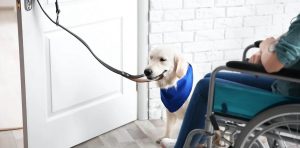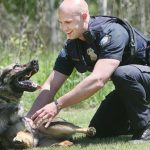New Obstacles For Service Dog Owners
July 9, 2020

While browsing through a Facebook group for guide, mobility and service dog recipients, a post by one of the members jumped out at me. ‘Did you dare to go out with your dog?’ it asked. ‘Are you able to go out of your home?’ Since the early days of the COVID-19 crisis in March, many have had their eyes glued to the news and are following government guidelines. But in all this turmoil, have we forgotten about citizens living with a disability?
I am a doctoral student at the University of Ottawa and a resource teacher for suspended or expelled students. I specialize in the areas of inclusion and service dogs. My research project allowed me to have Toulouse, an assistance dog from the Mira Foundation trained specifically for my special needs students. Since March 2019, she has been accompanying me everywhere and has helped me discover a reality that I didn’t expect.
As a researcher in this field, I am fortunate to have access to networks of assistance dog beneficiaries. With this article, I would like to offer them a public voice in order to draw a portrait of their reality since the beginning of the COVID-19 crisis.
A lack of accessibility
Ableism is the word used to describe the extent of multi-dimensional discrimination against people living with disabilities. People with working dogs are victims of it on a daily basis. Indeed, our society is designed for citizens without disabilities and de facto obliges people with disabilities to fight for their essential rights, such as accessibility, despite the provisions included in the Canadian Charter of Rights and Freedoms and the Canadian Human Rights Act , which ‘guarantee equal rights and freedom from discrimination to persons with disabilities.’
Normally, working dogs accompany these individuals and facilitate their daily life. However, since the beginning of the COVID-19 crisis, the barriers to accessibility have never been so great.
The risks of exclusion are increasing
Anne-Marie Bourcier is visually impaired and received her third guide dog from the Mira Foundation. With her dog, Machine, she routinely takes the bus and subway to go shopping or have lunch with a friend. Autonomy is the watchword for this duo. However, since the pandemic, they no longer go out in public. She wrote me a long email to let me know about her new reality.
These questions remain unanswered for Bourcier and many others. The physical obstacles are major, especially for a dog that has not been trained to deal with the health crisis and prevention measures. Machine is a Bernese mountain dog. (Anne-Marie Bourcier)
While we might assume that people give priority to those living with disabilities, the opposite is true. For example, another guide dog recipient explains that he often has to avoid people who do not give way to him.
Dogs and social distancing
Added to this are situations where the disability is not visible and the public believes that the dog is in training. Awareness campaigns on social distancing have been conducted by the CNIB Foundation. CNIB Awareness Campaign on Social Distancing for Guide Dog Recipients. Two metres separates a client and his guide dog from a person doing grocery shopping. Guide dogs do not understand social distancing. Thank you for helping us keep a safe distance. (Canadian National Institute for the Blind), Author provided (No reuse)
In addition to the physical obstacles, there are also psychological obstacles. ‘At the hospital, I need my dog and my partner for my MRI. I had to negotiate for entry,’ says Geneviève, a traction dog recipient. The mask makes it hard for her to breathe and she has to constantly adjust her tone of voice to give instructions to her dog. ‘I feel badly about taking her in. With the distancing, there is a fear of people and sometimes small alleys. I’m scared to go out again.
Thus, the risk of social isolation is amplified for service dog users who have to stay at home and forget about their routine.
The other side of the coin
Despite the difficulties, there are some positive experiences. Several beneficiaries are happy that the implementation of social distancing rules means nobody tries to pet their dog, which usually happens several times per outing. This distraction may cause the animal to make a mistake, which could put the safety of the user at risk.
In fact, all of them are grateful to have a companion during this crisis. In spite of the isolation, the beneficiaries can count on the reassuring presence of their animal. Marie Eve Leduc is the mother of a child diagnosed with an autism spectrum disorder (ASD) who has an assistance dog. She is relieved to have had Amhara for her boy.
After several months of confinement, the reopening of stores has also made going out again easier.
Arthur holds Amhara, a black Labrador service dog. (Marie Eve Leduc) Solutions exist
As the process of deconfinement continues in Canada, many recipients are concerned that they will be overlooked as the measures rarely take into consideration Canadians living with disabilities . A few solutions are therefore suggested for them, including priority entry at all times, reserved hours and a shopping assistance service.
Masks with a transparent screen or visors to allow deaf or hard of hearing people to read lips would be necessary in essential services, particularly at the reception desk. Finally, distancing could become permanent around recipients of working dogs.
In this wave of change, it is up to us to seize the opportunity to make our society a more accessible place.
The author thanks the beneficiaries of the Mira Foundation who have generously shared their photos and testimonials, as well as the Canadian National Institute for the Blind/Institut national canadien pour les aveugles for the illustration.













